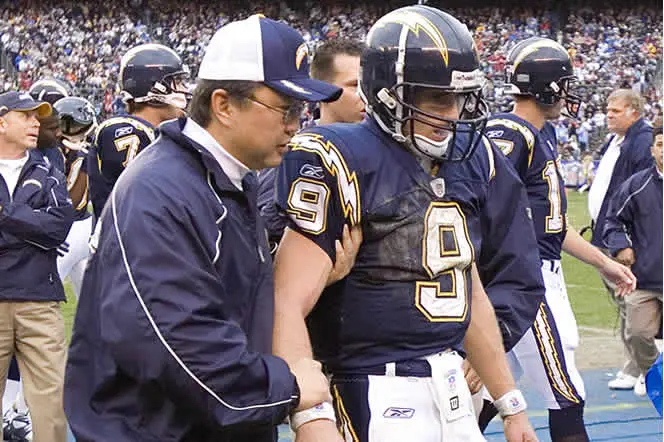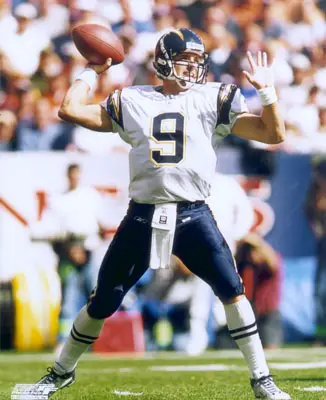Pickin’ Bolts: Shoulder Injury Forced Chargers’ Hand on Brees


In 2001 Drew Brees was coming off a very successful college career in which he threw 90 TD’s against 45 INT’s as a 3-year starter. The San Diego Chargers, had the first pick in the 2001 draft, needed a quarterback and the front-runner for that pick was the ultra-athletic Michael Vick. The Chargers traded the first pick to Atlanta, who drafted Vick, and selected LaDainian Tomlinson with the 5th overall pick and used their first pick in the 2nd round to draft Drew Brees.
Brees sat for most of his rookie season, but was the full-time starter for the 2002 season and he led the team to an 8-8 record while completing almost 61% of his passes and posting a 17/15 TD/INT ratio. It looked like the Chargers had a decent QB developing.
In 2003, Brees began the season as the starter but in week 8 he lost the job to Doug Flutie. Brees still started three more games that season and led the team to a 2-9 personal record (the team’s overall record that year was 4-12) and the team once again had the first pick in upcoming (2004) draft. Brees’ statistics regressed that year to a sub-58% completion rate and a 11/15 TD/INT ratio. The team, obviously, did not feel secure with their quarterback situation.
As the draft approached it became obvious the Chargers were going to take a QB and Eli Manning was the front-runner for the #1 pick. The Chargers drafted Eli, but then traded him to the Giants for Philip Rivers (but that’s another story). Rivers, as was the case then, held out for a large portion of training camp and the team headed into 2004 with Brees as the #1 signal caller.
Drew Brees once said in an interview that while he always took the job of a starting NFL QB seriously it wasn’t until the Chargers drafted Rivers that his ultra-competitive fire was lit. He hired a personal trainer. He worked with a personal chef. He starting studying more and cutting out distractions. The improvements were astounding. Brees, who had never averaged more than 7.1 yards per attempt averaged 7.9 YPA. He only threw for 3159 yards but he had a completion rate of over 65% and a 27/7 TD/INT ratio. He posted a passer rating of 104.8, which is nearly 30 points higher than his previous best (76.9 in ’02). The team posted a very good 12-4 win/loss record that season. And the legend of Drew Brees begins.
The following year Brees regressed a little bit but the team as a whole didn’t play as well. As the final week of the season approached, Chargers’ GM A.J. Smith told the team’s head coach, Marty Schottenheimer, that he wanted the younger QB, Philip Rivers, to start the team’s 16th game. Allegedly Smith was undecided about which QB he wanted to keep as the team’s starter going forward. Rivers, because of a lack of rookie-salary control within the Collective Bargaining Agreement, had a rather expensive annual salary. And Brees was about to become a restricted free agent. It would not have been wise for the team to commit to two large contracts at one position. Smith wanted to see how Rivers looked and give him an audition for other teams. Whether the team kept Rivers or Brees, Smith knew he could either trade Rivers or trade the rights to Brees.

The problem with this situation was that the general manager and head coach did not get along. Schottenheimer, when told to sit Brees, said that he was the head coach and that he would make that decision. And he did. He started Brees.
In that fateful game Brees dropped back to pass, and as he started his throwing motion he was hit and the ball came loose. He tried to dive on the loose ball and as he did so a Broncos defender did likewise, but landed on Brees, dislocating and severely injuring Brees’ shoulder.
The injury was bad enough that the Chargers knew they could no longer hold his rights and trade him. They allowed him to become an unrestricted free agent and he signed, obviously, with the New Orleans Saints.
In his 11 years with the Saints Brees has become a Hall of Fame caliber QB (something we only glimpsed in his 2004 season with the Chargers).
Fans frequently say that the Chargers kept the wrong QB. We can debate whether Rivers or Brees is better (usually in these debates the QB with more rings wins and Brees has one, where Rivers is obviously stuck on zero), but what isn’t really debatable is that the Chargers didn’t have a choice after that December 31st game. We can look at the facts now and talk about what might have been but it’s disingenuous to look at the facts now and suggest someone make a difference choice at that time (when things hadn’t played out).
I actually got to meet Brees shortly after he was drafted. That summer, in 2001, I was at a convenience store near Chargers Park and I saw a small BMW pull up right as I was walking in the door. I noticed three youngish, somewhat preppy looking people inside. I walked through the store and found the items I was purchasing and as I headed toward the checkout and I recognized Drew Brees walking towards me. I welcomed him to San Diego and shook his hand.
I was happy for Brees when the Saints won their Super Bowl. And I’m proud of the Chargers for passing on Vick and selecting Brees. And I’m proud of Brees for how hard he worked to become the QB he is. I wish him well…except this Sunday.
Thanks for reading.
Believer, husband, father, friend, football fan, car nut…